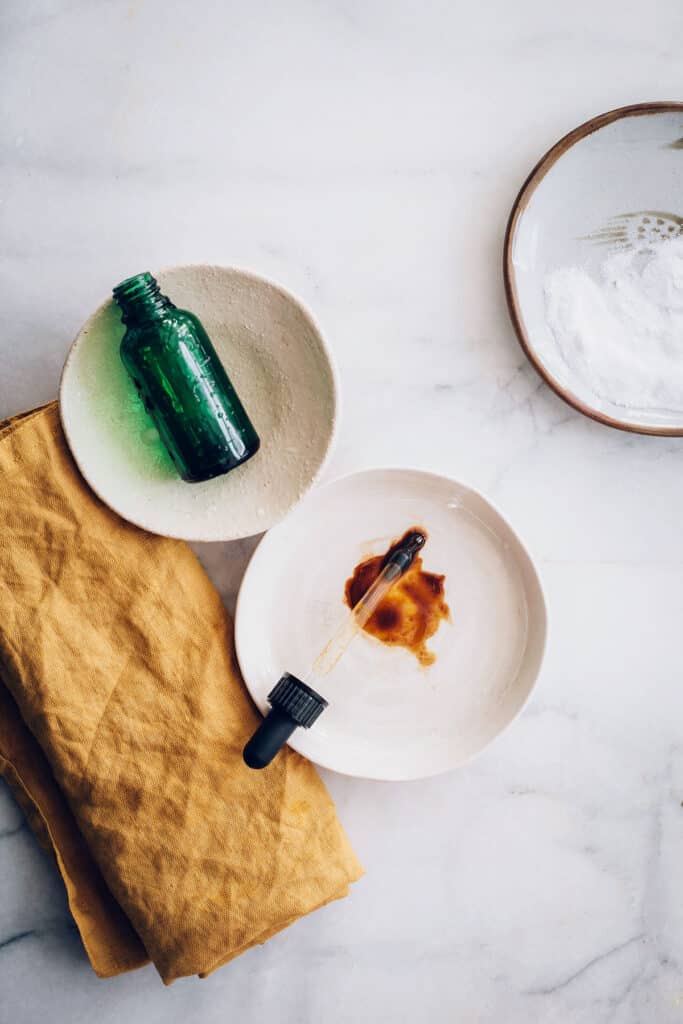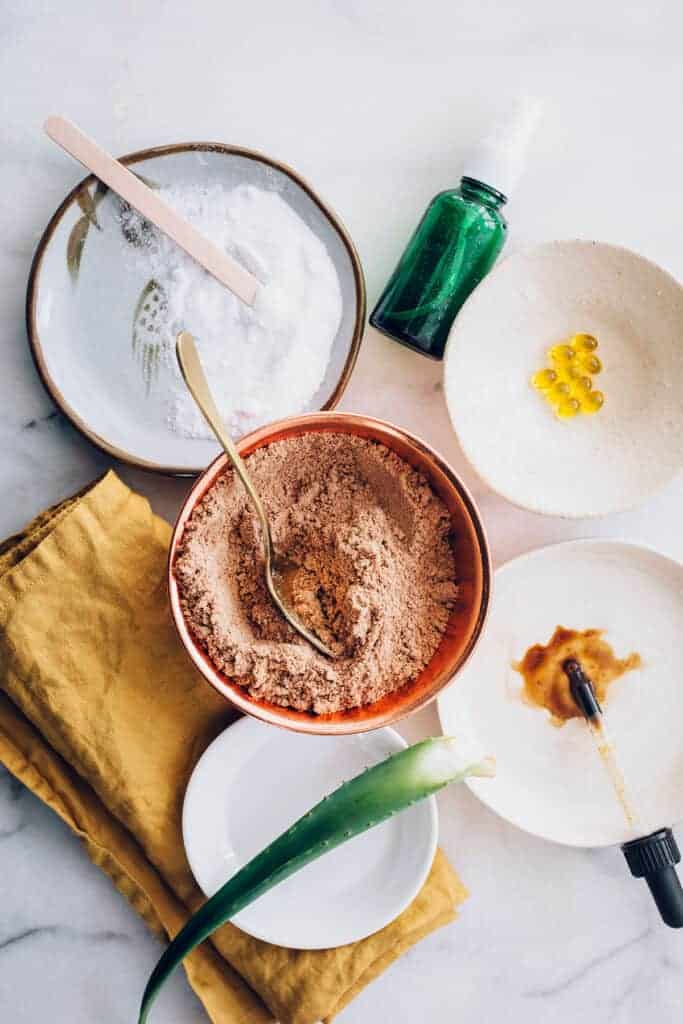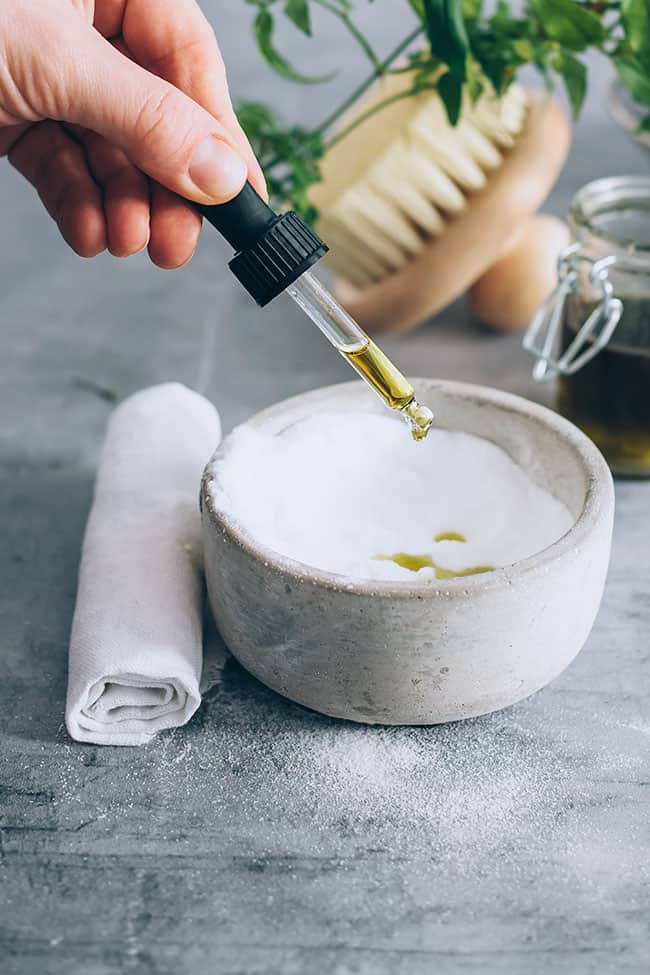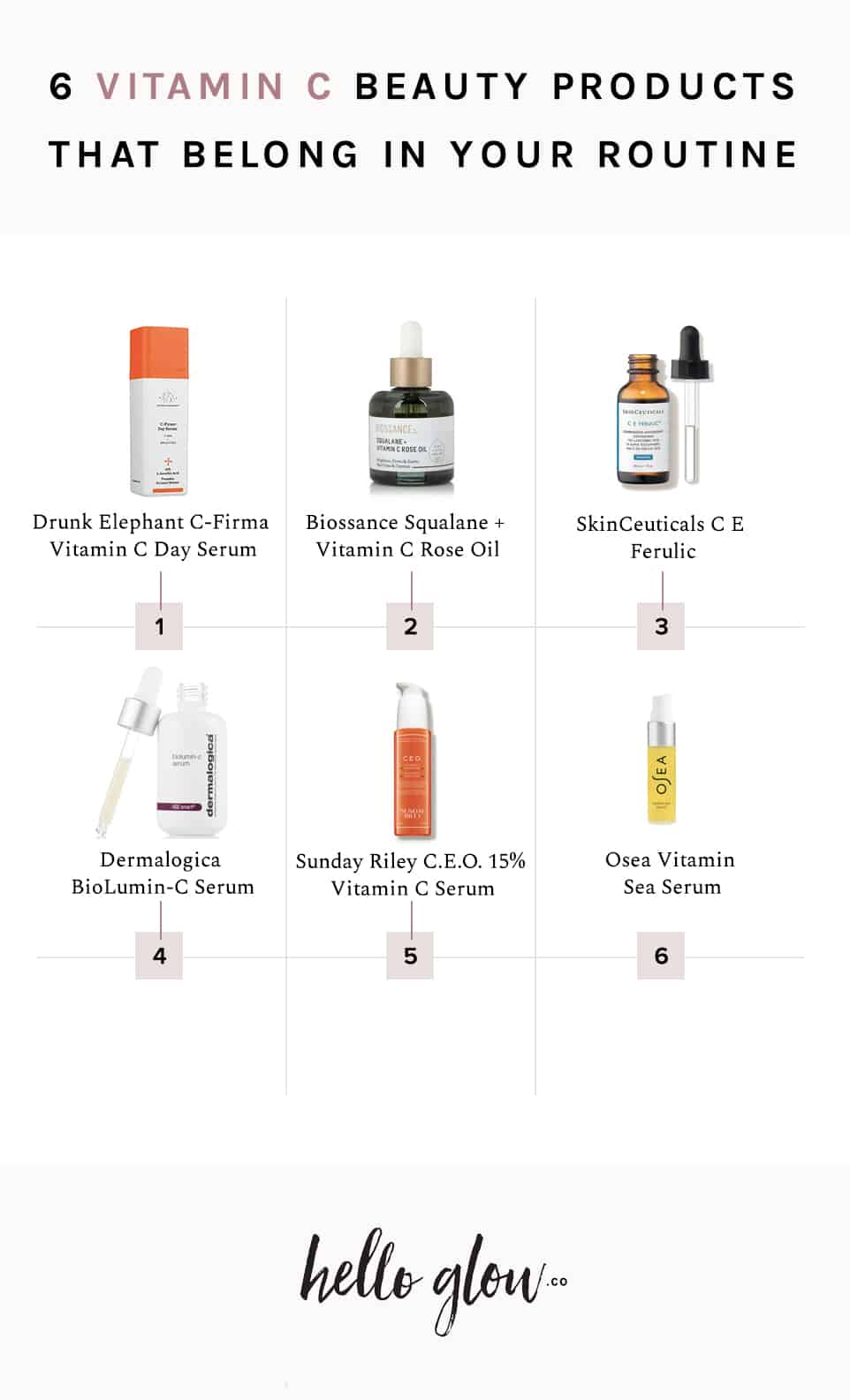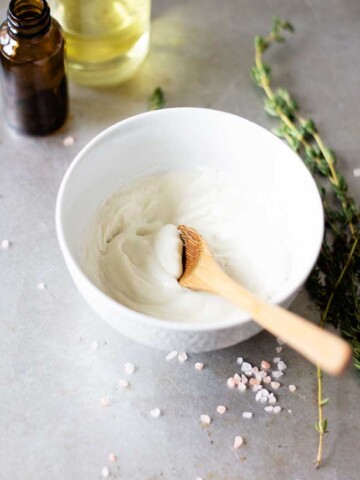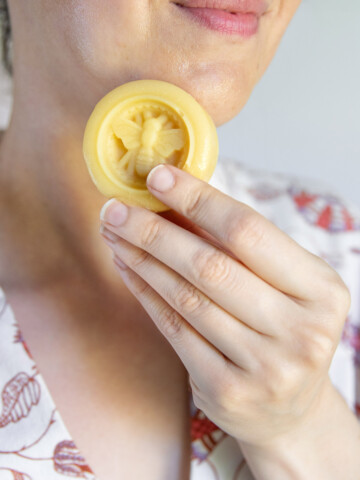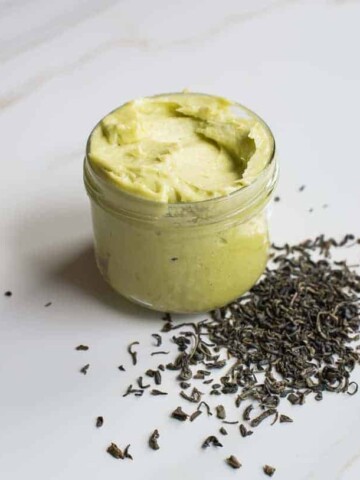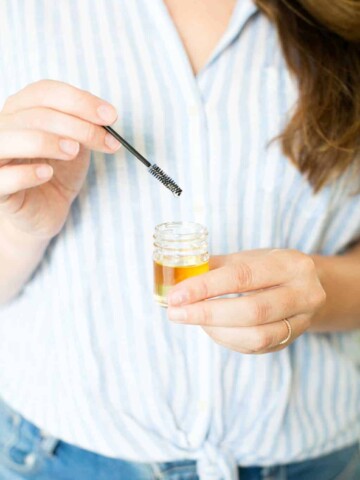Vitamin C is a gold-star ingredient for the skin. You'll find it in all kinds of skin creams for its antioxidant properties and ability to support healthy collagen [source]. As an antioxidant, vitamin C fights free radicals, which are caused by UV exposure and other environmental stresses. Want to add it to your skincare routine? Here are two recipes for making your own vitamin C serum that your skin will love—and so will your wallet!
Why Vitamin C?
Let's get into the why a little more. We often turn to vitamin C or load up on citrus when we're feeling yucky because it has internal benefits that boost immune health and help fight the common cold [source].
Vitamin C helps tissue repair, lowers blood pressure, and increases the body's ability to absorb iron [source]. Those may be some of the internal benefits of vitamin C, but how about the external rewards?
When applied topically, vitamin C does awesome things for your skin [source]! Not only can it help prevent future sun damage, but it is also effective at treating hyperpigmentation [source]. If a dull complexion is your concern, vitamin C should be added to your daily routine.
The benefits are many. We can also place adding extra hydration, balancing out skin tone, and regenerating skin cells on the list. A few months ago, I started using it—diligently—every morning before sunscreen, and I can already see results with a more even skin tone and lightening of my dark spots.
Vitamin C Skin Benefits
—Acts as an antioxidant that neutralizes free radicals from environmental stresses
—Reduces damage from UV rays
—Lightens the appearance of age spots
—Accelerates collagen production
—Speeds up wound healing time
—Decreases inflammation
—Alleviates dry skin
How can we increase our skin's vitamin C?
As we age, the vitamin C levels in our skin decrease, making us more susceptible to skin damage. Furthermore, exposure to UV light, pollution, and cigarette smoke lowers the amount of vitamin C found in our skin.
Is it possible to just increase our oral intake of vitamin C and get the same effects as topically applied vitamin C? No. Studies have shown that oral consumption alone does not have the same effects as topically applied vitamin C.
Topical vitamin C application results in an increased ability to protect against photo-damaged skin and a reduction in skin wrinkling. A combination of both internal and external vitamin C is ideal for optimal skin benefits.
Vitamin C Serum with Camu Camu Powder
Instead of buying expensive creams with synthetic forms of vitamin C, you can make your own using camu camu, an antiviral, vitamin C-packed fruit found in the Amazon rainforest. Combined with aloe vera’s healing properties, this vitamin C serum recipe with camu camu works to lighten and rejuvenate skin.
Why camu camu?
L-ascorbic acid is a synthetic form of vitamin C that's often used in both expensive commercial and homemade skin serums. While it provides potent skin benefits, it can also degrade quickly. Serums with ascorbic acid usually only last about a week before they begin the process of oxidizing and turning yellow, which means the vitamin C is becoming less and less active.
The Amazonian camu camu plant contains the highest level of naturally occurring vitamin C in the world [source]. The small berries are at least 30 times more potent than oranges, and it is an excellent antioxidant [source]. So you get the vitamin C skin benefits—plus the antioxidants, vitamins, and minerals—from a naturally derived ingredient.
Downside: it doesn't fully dissolve in the liquid, so the texture isn't smooth, making it harder to apply.
Camu Camu Vitamin C Serum
—4 teaspoons aloe vera gel
—2 teaspoons glycerin
—2 teaspoons camu camu powder
Combine camu camu and glycerin in a small bowl, and mix well. Add aloe vera and stir to combine. Transfer to a small container (one with a dropper is the easiest to use).
Vitamin C Serum with Vitamin C Powder
You can also use actual vitamin C powder. The major benefit is that it dissolves completely in water, so you don't end up with gritty sediment in your serum. You can use either L-ascorbic acid or ascorbic acid, but both will degrade rapidly.
Start with a small amount of vitamin C powder for two reasons: it breaks down quickly, losing its effectiveness after 1–2 weeks. So don't waste it by making a big batch. And it can cause skin irritation. More is definitely not better here.
Vitamin C Serum with Ascorbic Acid Powder
—3-½ teaspoons distilled water
—1 teaspoon vitamin C powder
—½ teaspoon glycerin
—10 drops vitamin E oil
—1-ounce dark glass dropper bottle
Combine the vitamin C powder and filtered water in a 1-ounce dark-colored glass dropper bottle. Swirl together until the powder is completely dissolved. Then add the glycerin and vitamin E oil. Store in the refrigerator for up to 3 weeks. If it starts to turn yellow, it's time to toss it.
How to Use a Vitamin C Serum
Ideally, vitamin C serums or drops should be applied in the morning, beneath sunscreen. Vitamin C actively fights free radicals, so apply it to the skin before you step out into the world of pollutants.
You can also use the serum in the evening after washing your face and applying toner but before applying your regular nighttime moisturizer. Gently pat it onto the face and neck, avoiding the eye area.
Want more vitamin C in your routine?
In addition to a daily serum, vitamin C can also be found in masks that can give your skin a concentrated boost of this powerful ingredient. Masks are applied to clean skin, typically at nighttime, and overnight masks give an opportunity for the vitamin C to work throughout the night, leaving your complexion with a beautiful glow when you wake up. Here's one to try:
Vitamin C Face Mask
- 1 teaspoon L-ascorbic acid powder
- 4 teaspoons jojoba oil (can be substituted with grapeseed or coconut oil)
In a small bowl, mix the L-ascorbic acid powder and the oil. It’s important for your vitamin C powder to be L-ascorbic because that means it’s a more stable form of vitamin C. Blend well and then apply with facial brush to face and neck. Leave it on for 10–15 minutes, and then rinse with warm water. Apply regular moisturizer and sunscreen.
Toner is another great way to introduce additional vitamin C into your regimen. This Hibiscus Vitamin C Toner is great for all skin types and can be used twice daily for that extra shot of benefits.
DIY Vitamin C Serum 2 Ways
Equipment
- Small bowl
- Darkly-colored dropper bottle
Materials
Camu Camu Vitamin C Serum
- 4 teaspoons aloe vera gel
- 2 teaspoons glycerin
- 2 teaspoons camu camu powder
Vitamin C Serum with Ascorbic Acid
- 3-½ teaspoons distilled water
- 1 teaspoon vitamin C powder (L-ascorbic acid)
- ½ teaspoon glycerin
- 10 drops vitamin E oil
- 1 ounce darkly-colored dropper bottle
Instructions
Camu Camu Vitamin C Serum
- Combine camu camu and glycerin in a small bowl. Mix well.
- Add aloe vera and stir to combine.
- Transfer to a small container (one with a dropper is the easiest to use, and a dark glass protects the vitamin C from degrading).
Vitamin C Serum with Ascorbic Acid
- Combine the vitamin C powder and filtered water in a 1-ounce dark glass bottle. Swirl together until the powder is completely dissolved. Then add the glycerin and vitamin E oil.
Notes
Don't want to DIY?
If you'd like to incorporate vitamin C into your daily routine but aren't sure where to start. Here are our most loved vitamin C serums.
1. Drunk Elephant C-Firma Vitamin C Day Serum
Unlike many serums available, this is extremely lightweight and can be used by normal to oily skin types in addition to those with dry/combination skin. The 15% L-ascorbic acid plus ferulic acid and 1% vitamin E combine to create a potent serum that minimizes signs of photoaging. This product should be used in the morning beneath your sunscreen.
2. Biossance Squalane + Vitamin C Rose Oil
This lightweight oil is ideal for normal to dry skin types. Sulfate and paraben free, it can be used both day and night. The addition of squalane helps lock in moisture while the chios crystal oil addresses firming needs.
3. SkinCeuticals C E Ferulic
Long touted as a holy grail of vitamin C serums, this one packs a potent punch. The combination of E and ferulic acid, in addition to the L-ascorbic acid, addresses free radicals, hydration, and brightening as well. This serum is very lightweight and can be used by all skin types.
4. Dermalogica BioLumin-C Serum
A stable vitamin C that is one of Dermalogica's newer products, this serum encourages cell turnover due to the lactic acid and promotes collagen production, thanks to the peptides. Ideal for all skin types, this serum is fragrance free and can be used morning and night.
5. Sunday Riley C.E.O. 15% Vitamin C Brightening Serum
If you prefer more of a lotion than an oil, this is a perfect choice. It is a creamy consistency and should be used daily. It is sulfate, fragrance, and paraben free and can be used on all skin types. Because it contains glycolic acid, this serum helps with congested skin that is prone to clogging.
6. Osea Anti-Aging Sea Serum
This serum is based in hyaluronic acid and contains vitamins A, C, and E while being oil free. So if you're nervous about clogging, this lightweight serum is easily absorbed. Turmeric helps with radiance and is high in antioxidants.
References (in order of appearance):
1. Pullar JM, et al. The roles of vitamin C in skin health. Nutrients. 2017.
2. Carr AC, et al. Vitamin C and immune function. Nutrients. 2017.
3. Dosedĕl M, et al. Vitamin C—sources, physiological role, kinetics, deficiency, use, toxicity, and determination. Nutrients. 2021.
4. Al-Niaimi F, et al. Topical vitamin C and the skin: mechanisms of action and clinical applications. J Clin Aesthet Dermatol. 2017.
5. Telang PS. Vitamin C in dermatology. Indian Dermatol Online J. 2013.
6. Smid J. Morphological and genetic diversity of camu-camu [Myrciaria dubia (Kunth) McVaugh] in the Peruvian Amazon. PLoS One. 2017.
7. Langley PC, et al. Antioxidant and associated capacities of camu camu (Myrciaria dubia): a systematic review. J Altern Complement Med. 2015.
This post was medically reviewed by Dr. Jennifer Haley, a board-certified dermatologist with extensive experience in medical, cosmetic, and surgical dermatology. Learn more about Hello Glow’s medical reviewers here. As always, this is not personal medical advice, and we recommend that you talk with your doctor.
Photos by Ana Stanciu
303
